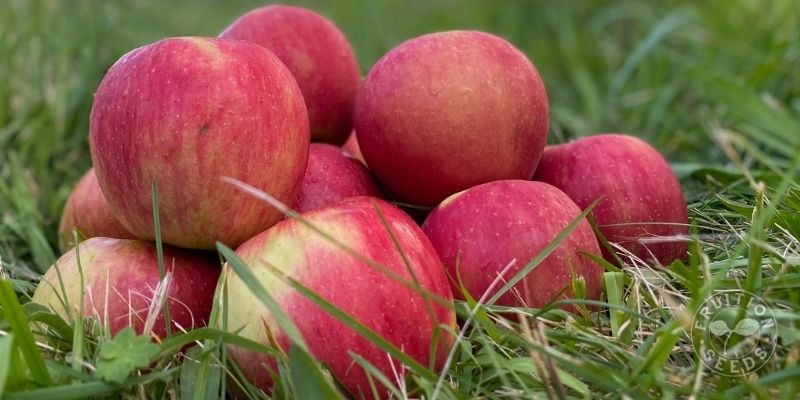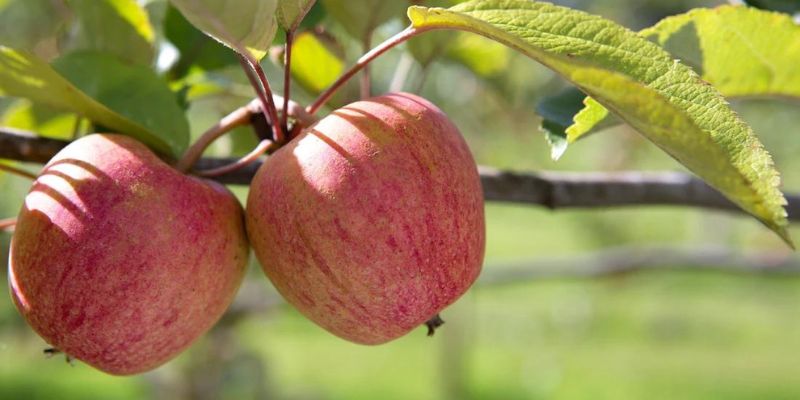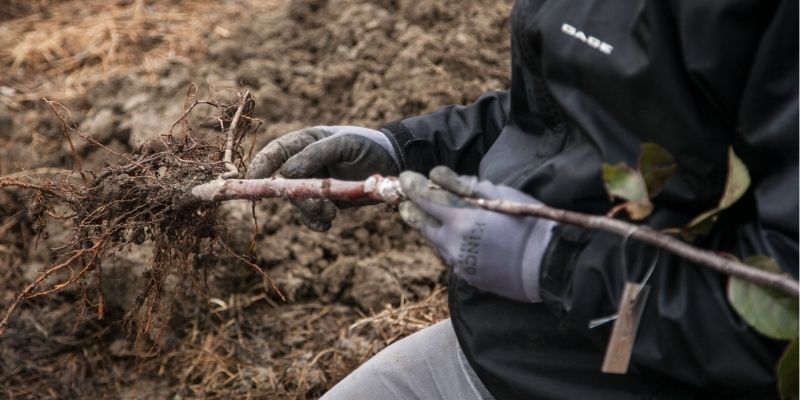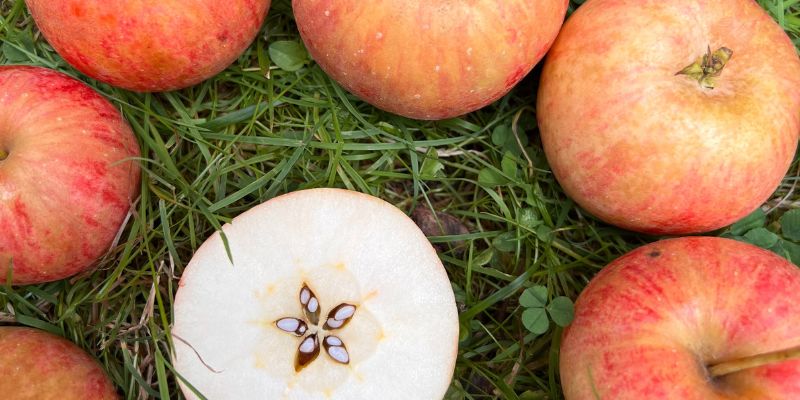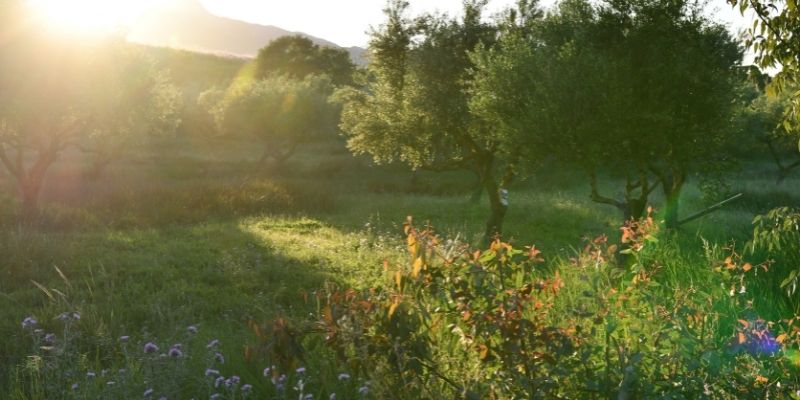
Friends, in our ongoing commitment to learning, transparency and honesty, we ask you to consider the role of Intellectual Property Rights (IPR) affecting the very fruit we all enjoy. Some of the fruit varieties we offer for sale are held under Plant Patents. And the Geneva Rootstocks that all of our Apple varieties are grafted onto are held under Plant Patents…
What are Plant Patents?
Plant Patents are derived from the U.S. Plant Patent Act of 1930, the first legal intellectual property mechanism that allowed patenting of plants. The scope of Plant Patents is limited to intentionally bred varieties of fruit trees, ornamentals, nut trees and more. A Plant Patent’s primary restriction is that “unauthorized” clonal/asexual propagation of Plant Patented varieties is prohibited for 20 years from the date of patent issue. But, it is fully permitted to use a Plant Patented variety to breed new, different, and potentially more regionally adapted varieties.
The intent of a Plant Patent is to protect & reward (for a limited number of years) the time & human energy expended, and of course the sizable capital investments of fruit tree and ornamental plant breeders. Plant Patents have become commonly used by University, Individual, and Corporate Entity plant breeders. Per-tree-sold royalties derived from propagation licensing to nursery businesses are a primary source of livelihood and funding that supports ongoing breeding.
None of the Fruit Trees we offer for sale have been subjected to Genetic Engineering. Some people associate the word “patent” with Genetic Engineering. Most, if not all, Genetically Engineered lifeforms have been held under Utility Patents (aka Trait Patents), which is a very different type of legal IPR mechanism than the Plant Patent. Our love and awe of plants and people precludes us from ever knowingly offering any plant bred by Genetic Engineering, which includes CRISPR and its gene editing ilk.
Which of the fruit varieties and rootstocks that Fruition sells are held under Plant Patents, and when do those Plant Patents expire?
- The CrimsonCrisp Apple is held under Plant Patent, which expires in 2025.
- The Cordera Apple is held under Plant Patent, which expires in 2039.
- PF 24C Peach is held under Plant Patent, which expires May 8, 2024.
- Black Ice Plum is held under Plant Patent, which expires on December 3, 2024.
- Triumph Apple is held under Plant Patent, which expires in 2041.
- Geneva 935 rootstock on all 2024 apple offerings is held under Plant Patent.
- Krymsk 6 roostock on BlackGold Sweet Cherry and WhiteGold Sweet Cherry is held under plant patent.
- Krymsk 1 rootstock on Satsuma Japanese Plum is held under Plant Patent.
How does all this impact the Fruit Trees offered by Fruition that are held under Plant Patents?
Fruit tree varieties are commonly perpetuated by taking cuttings, traditionally known as scionwood or budwood, from an appreciated & tasty tree, and then grafting that scionwood onto a rootstock to make another tree from that original tree….and so on! This means that (for example) every Honeycrisp apple tree grown in the world is actually derived via scionwood cuttings from either the original “mother tree” of Honeycrisp or her clonal/grafted offspring.
If a fruit tree variety is held under an active Plant Patent, like Cordera Apple, only those with license or permission from the breeder/patent holder can take scionwood cuttings from another Cordera Apple tree and graft additional Cordera trees during the 20 active years of the Plant Patent. When its 20 year Plant Patent expires in 2039, we can share all the Cordera Apple scionwood we want with each other.
Did you know? Scionwood Swaps or meets are very much like Seed Swaps, with people sharing scionwood cuttings from 100s of fruit varieties with each other at little or no cost. Grafting skills are also often taught at Scionwood Swaps!
How does all this impact the Rootstocks offered by Fruition that are held under Plant Patents?
Apple Rootstocks started out as wild apple trees upon which people grafted scionwood cuttings from better tasting apple trees. Just as people long ago discovered & propagated the best tasting apple trees we now prize as heirloom varieties, they also discovered some wild trees and their seedlings had better root systems, were more cold hardy, and had other good traits that made them ideal rootstocks. For example, the original dwarfing apple rootstock was called “Paradise” reflecting its use as a space saver in the walled gardens of the elite. The “Paradise” apple rootstock was in use for possibly 1000 years, and then provided the basis for breeding the modern versions of semi-dwarf and dwarf apple rootstock.
Today, new apple rootstock types are bred across the globe to be place-adapted, hardy in stressful conditions and resist insects and diseases. These recent apple rootstock varieties are clonally propagated by tissue culture or rooted cuttings to be sure those good traits are uniformly expressed. Even more time consuming and difficult to breed than new edible Apple varieties, royalties from Plant Patented rootstock sales support ongoing research and breeding.
During the active 20 year legal protection of Plant Patented Rootstocks like the Geneva series, those without license or permission from the breeder/patent holder shall not propagate nor share rooted cuttings of these rootstocks with other gardeners and farmers.
We can breed from these Plant Patented fruit varieties? How does that work?
Let’s continue to use the Plant Patented Cordera Apple as an example. The flowers on a single Cordera Apple Tree are self-infertile, like nearly all apple varieties. This means that pollen from a different variety of apple is needed to fulfill fertilization of those Cordera Apple Tree flowers….and produce an eventual harvest of Cordera fruit!
While we prize the tasty Cordera fruit, the Tree itself is using that fruit as a desirable dispersal vehicle for….SEEDS! When we plant the seeds from within a Cordera Apple, we are sowing a diversity of flavor potential. Some of the seedlings may yield unpalatable fruit…and some may be better tasting and more adapted to our local region than the Cordera Apple variety itself! It will take a number of years for those Cordera seedlings to mature & bear fruit, but the results are open source, new apples that no one but you and your community have ever eaten.
The planting of Cordera Apple SEEDS to grow new unique fruit trees is completely legal and allowed even while Cordera Apple is protected under an active Plant Patent. Going one step farther, we can learn to play “Bee”, and transfer the pollen directly between two of our favorite Apple varieties whether they are patented or not. This is exactly the first step to how a variety like Cordera Apple was bred in the first place!
Did you know? Planting apple seeds for rootstock use is how people grew their own apple rootstocks for centuries! Apple rootstocks like Geneva 41 are truly just regular apple trees that will produce their own unique fruit if they are never grafted upon. We are legally free to collect seeds from these patented Geneva rootstock fruits, and grow something new and useful.
Fruition’s Commitment to You, Fruit Trees and Generations to Come
We firmly believe individuals and communities freely and respectfully propagating plants is a critical part of relationships among humans and plants. We support efforts to ensure that such propagation for nourishment, enjoyment, and sharing can be a practice that everyone has the opportunity to share in. We at Fruition commit to sharing the skills and materials of Grafting and Fruit & Nut Tree Breeding. While we are not experts in these areas, we feel these skills are important tools for maintaining human-plant relationships that are inherited through generations.
We also support the hard work of independent plant breeders and publicly funded plant breeding programs developing the delicious and disease resistant classics of tomorrow. And we soberly acknowledge that carrying varieties held under Plant Patents is a conscious choice, and not by mistake or accident. Our fruit & nut tree offerings are vetted based upon the ecological benefit to the community and quality of fruit. In curating future offerings, we will expand our offerings of non-Plant Patented varieties, including disease resistant heirloom and classic varieties.
We remain open to your thoughts, input and questions about Plant Patents. Please reach out to us at support@fruitionseeds.com. The conversation is not over, and all of us are participants.
Additional Web resources and readings:
https://www.uspto.gov/web/offices/ac/ido/oeip/taf/data/patdesc.htm
https://www.uspto.gov/patents/basics/types-patent-applications/general-information-about-35-usc-161
https://seedalliance.org/2021/utility-patents-and-their-discontents/
https://seedalliance.org/resources/seed-patent-watch/
https://inmotionmagazine.com/global/vshiva4_int.html
https://www.law.cornell.edu/wex/intellectual_property
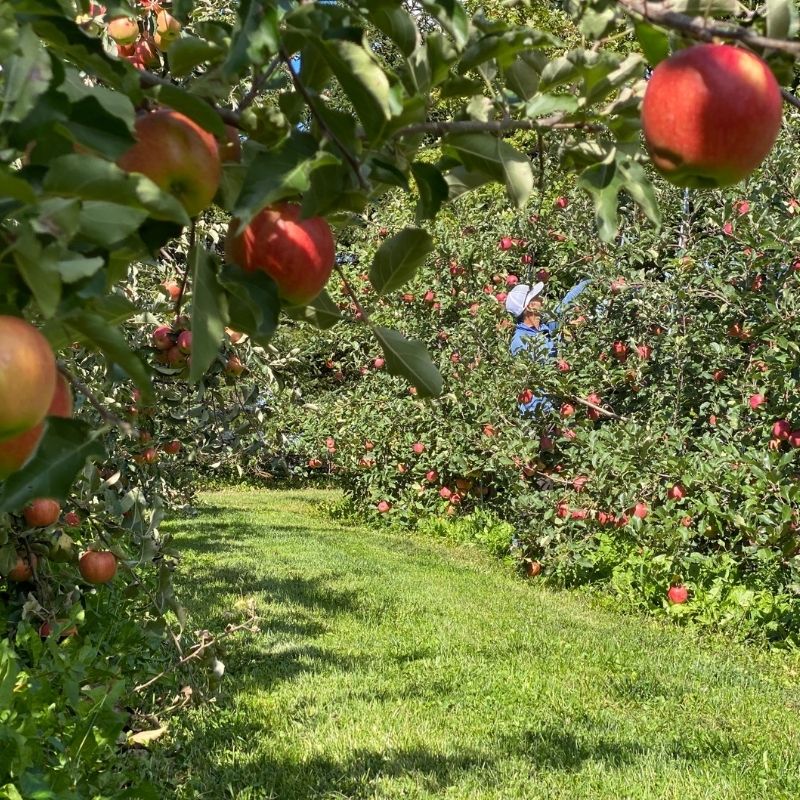
Enjoy Fruition's
Organic Apples & Orcharding Course!
Fruition’s free course shares dozens of video tutorials to surround you with abundance for seasons to come.
We look so forward to joining you on the journey!

